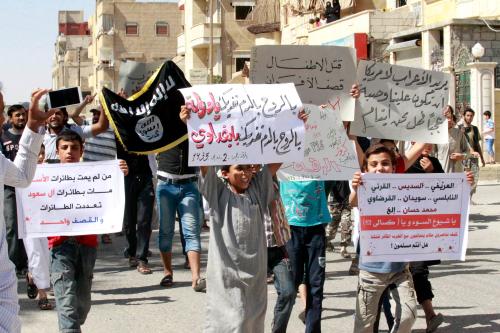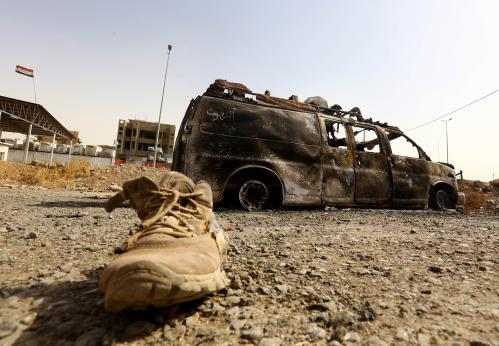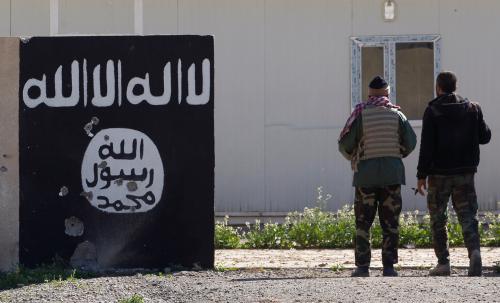Editors’ note: In this piece, originally published by The Atlantic, Shadi Hamid examines why trying to think like the Islamic State is so hard—and risky.
In killing 130 civilians in Paris—the worst such attack in France since World War II—ISIS has forced us to contend, once again, with the question of the “rationality” of self-professed ideologues. Since it wrested the world’s attention with its capture of Iraq’s second-largest city in June 2014, the extremist group has prioritized state-building over fighting far enemies abroad. This is what distinguished ISIS: It wasn’t just, or even primarily, a terrorist organization. It had an unusually pronounced interest in governance. As Yale University’s Andrew March and Mara Revkin lay out in considerable detail, the group focused its energy on developing fairly elaborate institutional structures in the territory it controlled within Iraq and Syria. ISIS wasn’t simply making things up as it went along. It may have been mad, but there was a method to the madness.
But why, then, attack France—one of the more militarily aggressive Western powers—and potentially provoke a massive retaliatory response that would threaten the very “caliphate” it had spent so much time building? Care is needed in drawing conclusions from this apparent shift in targeting. ISIS has always had international ambitions; it was more a question of when, not if. Part of the challenge is in divining why exactly ISIS chose to stage these attacks at this particular time. And this raises a difficult set of questions: To what extent, in the wake of the Paris attacks, should ISIS be thought of as rational, and how, in turn, should that inform efforts to understand the group and develop a strategy to counter it?
The attack on France may very well prove to be ISIS’s first obvious, huge mistake, at least from a caliphate-building perspective. That said, while many outside observers might think ISIS made a major miscalculation, the group—or whatever part of it directed the attack—probably doesn’t agree. Otherwise, why would they have done it?
* * *
For a remarkably brutal, absolutist, and apocalyptic organization, ISIS had pursued a strategy that was deliberate, insistent, and ultimately successful. It was able to carry out, as Charles Lister writes, “a very methodical and multi-staged strategy of recovery, growth, expansion, and consolidation.” Yet, it was also fond of its apocalyptic fantasies, which featured prominently in the group’s propaganda and even seemed to affect specific battlefield decisions. ISIS’s state-building and messianism coexisted in uneasy tension. There was little to suggest this was sustainable in the long run (although, as ever, that raises the question of how long the long run is). As Will McCants, author of The ISIS Apocalypse, put it to me recently: “The caliphate may require caution but the apocalypse requires abandon.” Can an individual—or, for that matter, an entire organization—be, at once, both cautious and in the throes of reckless abandon?
The question of why ISIS would want to goad the West is a challenging one for precisely this reason. We don’t know exactly how rational ISIS is, particularly in the absence of real insight into the group’s internal deliberations. And, in any case, “rationality” may take on a different meaning for those who believe not just in the imminence of the end times (which is fairly common in the Middle East), but also that the day of reckoning can be hastened.
These caveats notwithstanding, let’s try to imagine ourselves in the position of the terrorists. Oddly enough—in what was perhaps a first for a U.S. president—this is exactly what Barack Obama did just a month after the beheading of the American journalist James Foley.
Can an individual—or, for that matter, an entire organization—be, at once, both cautious and in the throes of reckless abandon?
Obama hypothesized that if he were “an advisor to ISIS,” he would have released rather than killed hostages like Foley, with notes pinned to their chests no less, saying “stay out of here.” It is a self-evident banality that very few American politicians take seriously: Understand your enemy in order to defeat him. Obama should be lauded for being both able and willing to imagine himself in diverse political contexts, but the statement was remarkably naive, suggesting a readiness to apply a straightforward “rational actor” lens that doesn’t necessarily apply in the fog of jihadist war. This role as analyst in chief is one the president has warmed to. He regularly insists, for example, that world leaders are acting against their own rational self-interests, whether it be Vladimir Putin, with his “reckless” interventions in Ukraine and Syria, or the Israelis, for failing to support an Iranian nuclear deal that Obama thinks will make them safer. As for the Iranians, once the nuclear deal was struck, the hope, sometimes explicit but always somewhere underneath the surface, was that Iran would “moderate” and be induced to become a constructive partner in the resolution of regional conflict. Being “constructive” was in their interest, after all, just as it was in America’s, and just as it was in Russia’s.
Any assessment of “instrumental rationality”—the idea that individuals carefully weigh costs and benefits in seeking maximum political utility—is about means rather than ends. In other words, once we know what the actors’ goals are, we can then work backwards and see to what extent they’re “rationally” acting in the service of those goals. So even if we assume ISIS is reasonably rational, it still leaves open the question of what they’re trying to achieve in the first place. In his ISIS-advisor mode of 2014, Obama assumed that ISIS wanted America out; it’s also possible that the group wanted America in. This was al-Qaeda’s wager after the September 11 attacks: that any large-scale Western invasion of Arab lands would redound to its benefit. The United States, so the logic went, would be drawn into a war it couldn’t hope to win—one that would drain U.S. resources, rally Muslims against foreign intruders, and puncture the perception of American military superiority; ultimately, the United States—with its supposedly low tolerance for casualties—would grow exhausted and withdraw. Which raises an interesting counterfactual: If Americans had known this about al-Qaeda’s designs—much of which only became clearer well after 9/11—would that have altered the thinking of at least some policymakers in the march to war in Iraq in 2003?
In some tension with this “bog them down” theory of jihadist warfare is the notion of “paying the price,” which features prominently in jihadist political theory, including in Abu Bakr Naji’s influential Bush-era treatise The Management of Savagery. The idea here is to punish countries to deter them from future military action. Perhaps this is what ISIS hoped to do in Paris. Such an approach, however, would suggest a major flaw in the group’s ability to anticipate how targets will respond to their provocations. After all, a mass-casualty attack on France would presumably make the French more, not less, likely to support greater military action against ISIS. At the same time, there is at least one prominent recent case—the 2004 terrorist attacks in Madrid—where “punishment,” just three days before a hotly contested election, may have contributed to the victory of socialist Prime Minister Jose Luis Zapatero, who soon pulled Spain’s forces from Iraq, making good on a pre-election promise.
What all this resembles is a kind of two-player game where each side acts either in response to or in anticipation of the other’s moves—the catch being that neither side has full information about or insight into the decision-making process or even the operating assumptions of its adversary. It’s a situation ripe for miscalculation. While many jihadist theoreticians are “astute observers” of U.S. counterterrorism policy, this doesn’t necessarily lead to the correct conclusions. After all, even Americans who obsessively follow the twists and turns of U.S. policy have repeatedly either overestimated or underestimated Obama’s willingness to intervene in various Middle Eastern theaters.
Another possibility is that Western military responses to ISIS are “inelastic,” meaning that regardless of what ISIS does or doesn’t do, U.S.-led international efforts will not change significantly, considering the profound reluctance, at least under the Obama administration, to do much more than the United States is already doing. The scholar of jihadist movements Cole Bunzel has colorfully referred to this as ISIS’s “Donald Trump-like immunity to the consequences of the awful things it does.”
If this debate has a dreamlike quality to it, that’s because we’ve had it before. After ISIS beheaded Foley and another American journalist, Steven Sotloff, in August and September 2014, many of us wondered why the group would risk provoking a superpower, which up until then had done little to prioritize the fight against ISIS. Months later, ISIS burned a Jordanian pilot to death, prompting the Jordanian government to vow an “earth-shaking” response and “blood vengeance.” “The gloves have come off,” said King Abdullah. Yet, after an initial surge of military force, including air strikes, Jordan receded to its previous levels of engagement in the struggle with ISIS. General John Allen, Obama’s special envoy for the counter-ISIS coalition, declared that the murder of the pilot would “be one of these moments that created a unity of purpose and a unity of effort among the nations [of the world].” It wasn’t. None of these incidents were.
Cole Bunzel has colorfully referred to ISIS’s “Donald Trump-like immunity to the consequences of the awful things it does.”
Presumably there is some “red line” that would trigger a massive retaliatory response on the part of the United States and its allies, but it may very well be the case that such a line doesn’t, for better or worse, exist. In the aftermath of the Paris attacks, it appears that the U.S. will simply double down on its current strategy with an intensification of air strikes and perhaps a marginal increase in special-operations forces and advisors in Syria and Iraq. As for ground forces, Obama ruled them out just three days after ISIS struck France. The president had rather quickly made up his mind. “We have the right strategy and we’re going to see it through,” he said. “There will be an intensification of the strategy we have put forward, but the strategy we have put forward is the strategy that will ultimately work.” This, to use the jihadists’ own terminology, indicates that ISIS may not pay that much of a price for its crimes.
* * *
In the months leading up to the Paris attacks, ISIS may have reached its peak as a proto-state, having already captured and held as much territory as it could ever hope to in its base of Syria and Iraq. In fact, ISIS was beginning to lose significant swathes of territory, including key border towns, and found itself encircled around the Sunni city of Ramadi in Iraq, its most important territorial acquisition of 2015. Recruitment of foreign fighters was slowing. As Mara Revkin writes, even governance—one of ISIS’s stronger suits (at least compared to the competition)—had increasingly become a liability. Various accounts paint a picture of mismanagement, declining morale, turf wars, and infighting within the ranks. Even if these claims are overstated, all was evidently not well in the caliphate. At best, ISIS could hope to regain some of its recently lost territory. At worst, they would suffer more battlefield losses, including in Ramadi. For a group whose slogan was “remaining and expanding,” these scenarios weren’t particularly promising.
Just as it was losing momentum in its Iraqi and Syrian strongholds in the second half of 2015, ISIS was making gains elsewhere, with an increasingly sophisticated insurgency in the Sinai, a pledge of allegiance from Africa’s most feared terrorist group, Boko Haram, and a growing presence in Afghanistan and Yemen. On October 31, it scored a major propaganda victory with the downing of a Russian airliner—one of the worst mass-casualty terrorist attacks of the past decade. ISIS was announcing its arrival as not just a proto-state with tax collection and a budget, but also as the world’s most effective terrorist organization, outflanking its rivals in al-Qaeda. ISIS’s shift in targeting served any number of other purposes: distracting from battlefield losses, boosting morale among its foot soldiers, and, of course, capturing the headlines. These, though hard to measure, are real and relevant “momentum” gains. Perhaps, then, from ISIS’s standpoint, the price of somewhat more intensified Western military intervention was a price worth paying.
If and when ISIS loses territory, it may decide to compensate. Its apocalyptic fantasies might become more lurid, not less.
In this next phase of conflict, ISIS will likely lose more territory. The costs of endless war abroad will compromise the quality of governance at home, further undercutting local Sunni support. This may be grounds for optimism, but it’s not quite that simple. As the terrorism expert Clint Watts reminds us: “If an extremist group that has seized territory starts to lose it, it will be highly incentivized to turn to terrorist operations that allow for maximizing effects at a lower cost.” Advances for the international coalition may actually heighten the risk of more terrorism in the short run. The relationship between loss of territory and launching attacks abroad is non-linear—it may actually look more like a bell curve—and therefore hard to predict. It is fair to assume, though, that if and when ISIS loses significant territory, it may decide to compensate in an effort to underscore its relevance and create the illusion of momentum, if not the substance. Its apocalyptic fantasies might become more lurid, not less.
* * *
Why people—and organizations—do what they do is one of the most fascinating (and sometimes frightening) questions considered by political scientists. There are elaborate, formal models of rational-choice theory, in which human behavior is consistent, predictable, and straightforward, yet we know, from our own lives, that we constantly act against our own interests. Oftentimes, we know we’re acting against our own interests but plod along anyway, oblivious to the costs or perhaps taking pleasure in that feeling of weightlessness and abandon that often accompanies irrational decisions.
Considering all of the variables discussed here, the United States and its allies run the risk of gaming the scenarios and adjusting their response to fit the opposite of whatever they think ISIS wants them to do. There’s a hint of this in the rhetoric of Barack Obama and French officials—that ISIS wants the West to go all in because that would feed the group’s narrative, and that Western powers obviously can’t give ISIS what it wants. But ISIS isn’t al-Qaeda. Holding fixed territory inevitably changes the calculations of even hardened ideologues, particularly when territorial control is a core element of the ideology itself.
A claim to a caliphate—even one with diminished territory—is central to the group’s claims of Islamic-ness. The caliphate, ISIS leaders argue, is an obligation upon the Muslim community. It is the foundation upon which everything else is built, and, without it, Islamic law cannot be properly or legitimately implemented. If the U.S. deployed ground troops, it could clear ISIS from its strongholds of Raqqa and Mosul at least temporarily, as even Obama admits. This would be a severe blow to ISIS—undermining its entire raison d’être–in a way that it never was with al-Qaeda. This doesn’t mean that the United States should deploy ground troops, but it does mean that officials should be careful about presuming to know what ISIS wants.
Perhaps their apocalypticism emboldens them to take risks. Even if their gambit backfires, they still believe they have heaven to hope for.
Regardless of what the U.S. and its allies do, ISIS will prove an unusually challenging foe. And this is where religion and particularly apocalyptic religion matter. Take, for example, the ISIS leader Abu Muhammad al-Adnani’s September 2014 statement, in which he addresses the West directly, saying, “being killed … is a victory. This is where the secret lies. You fight a people who can never be defeated. They either gain victory or are killed. And O crusaders, you are losers in both outcomes.” These two goals—gaining victory (in a temporal sense) and getting killed in the process of seeking that victory—are mutually exclusive objectives. Yet it is altogether possible that Adnani and other ISIS true believers are more than comfortable with either outcome, if it comes to that. They would of course prefer to hold territory and entrench their caliphate. They may have judged (seemingly correctly) that the Paris attacks would not lead to a shift in U.S. strategy, and that they could withstand something short of a full ground offensive. Either way, though, brazenly targeting the West is a very risky endeavor. Perhaps their apocalypticism emboldens them to take such risks. Even if their gambit backfires, after all, they still believe they have heaven to hope for. They may welcome the prospect of dying while triggering a regional conflagration with the United States at its center.
Still, it is clear that ISIS has preferences, all other things being equal, even if we don’t quite know how those preferences play out in practice. It can be tempting to use ISIS’s apocalyptic fervor as a kind of analytical deus ex machina—something that I gravitated toward immediately after the attacks. This was the only way I could make sense of the decision to attack Paris. It seemed so, well, irrational. I assumed that such horrifying attacks in the heart of Europe would provoke a shift in U.S. strategy. I was wrong. They haven’t. Perhaps there wasn’t a red line. Perhaps the tolerance for Middle Eastern chaos, which is increasingly our chaos in the West, was greater than I thought. It dawned on me that maybe I had made a different kind of mistake: Instead of misjudging ISIS’s rationality, I had misjudged our own.
The Brookings Institution is committed to quality, independence, and impact.
We are supported by a diverse array of funders. In line with our values and policies, each Brookings publication represents the sole views of its author(s).







Commentary
Is there a method to ISIS’s madness?
November 24, 2015